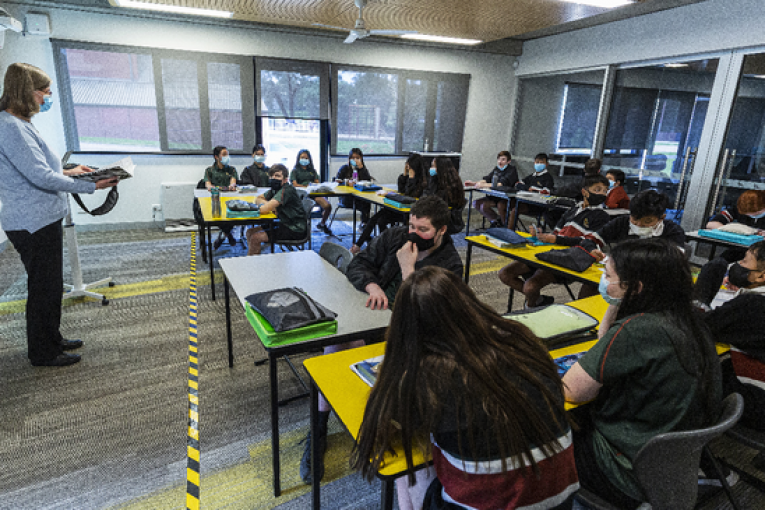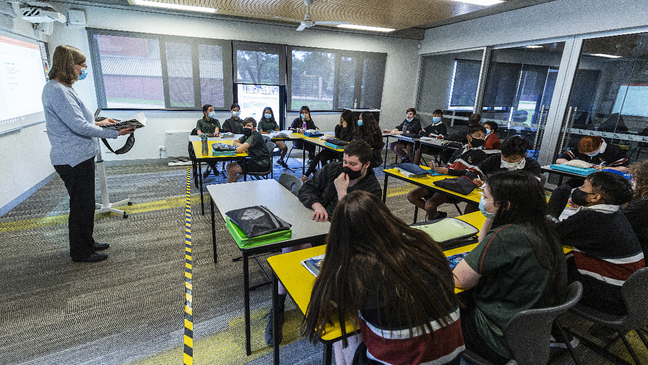

By Jake Wylie
OKLAHOMA CITY, OK – An Oklahoma censorship bill restricting both teachers and students from being able to formally teach or discuss race and gender in classrooms has been challenged by several activist groups in a lawsuit.
The bill, HB 1775, went into effect this summer.
Since then, as the lawsuit claims, teachers in Oklahoma’s school districts have been banned from using terms like “white privilege” and “diversity” with their students, and seminal books like To Kill a Mockingbird and Raisin in the Sun have been removed from school curricula.
Among the bill’s provisions are bans on teachers from telling students that a person “should not be discriminated against or receive adverse treatment solely or partly because of his or her race or sex” or that “meritocracy or traits such as hard work ethic are racist or sexist or were created by members of a particular race to oppress members of another race.”
Challenging the bill are the American Civil Liberties Union, the ACLU of Oklahoma, the Lawyers Committee for Civil Rights Under Law (LCCRUL), and Schulte Roth & Zabel LLP on behalf of the plaintiffs which includes the University of Oklahoma’s chapter of the American Association of University Professors (OU-AAUP), the Black Emergency Response Team (BERT), the Oklahoma State Conference of the National Association for the Advancement of Colored People (NAACP-OK), the American Indian Movement (AIM) Indian Territory on behalf of itself and its student- and teacher-members, high school teachers Anthony Crawford and Reagan Killackey, and a high school student.
In their lawsuit, filed in the U.S. District Court for the Western District of Oklahoma, the plaintiffs claim that the bill’s simultaneous “unclear,” “overbroad” language and severe restriction on discussions on race and gender in Oklahoma classrooms is in blatant violation of the school’s employees’ First Amendment rights.
Specifically, the lawsuit claims that HB 1775 violates employees’ right to free speech “because it prohibits educators from teaching about specific topics of race and sex, and it imposes restrictions on the ideas that students may be exposed to in public schools.”
Emerson Sykes, an attorney with the ACLU Speech, Privacy, and Technology Project, criticized the bill, saying that young people deserve an inclusive and  accurate history in school without censorship or discrimination. Sykes also pointed out that the bill was simply written badly.
accurate history in school without censorship or discrimination. Sykes also pointed out that the bill was simply written badly.
“HB 1775 is so poorly drafted – in places it is literally indecipherable – that districts and teachers have no way of knowing what concepts and ideas are prohibited,” said Sykes. “The bill was intended to inflame a political reaction, not further a legitimate educational interest.
“These infirmities in the law are all the more troubling because the bill applies to public colleges and universities, where the First Amendment is especially protective of academic freedom,” she added.
“We believe all students deserve to have a free and open exchange about our history – not one that erases the legacy of discrimination and lived experiences of Black and Brown people, women and girls, and LGBTQ+ individuals,” said Lilly Amechi, a plaintiff and representative of BERT.
The bill’s authors said that the bill was intended to prohibit conversations around certain topics, including implicit bias, systemic racism, and intersectionality. These topics were taken from President Donald Trump’s failed Executive Order 13950, which attempted to censor government contractors.
“Racism is not an Oklahoma value and it has no place in our schools,” said Ryan Walters, a long time teacher and current secretary of education in Gov. Kevin Stitt’s cabinet, noting he applauded Gov. Stitt for fighting the lawsuit.
“HB 1775 ensures that our students can receive an honest depiction of our past, while protecting them from harmful slander promoted by radical ideologies,” said Walters. “As a history teacher and Oklahoma Teacher of the Year finalist, I understand the complex history of our great nation. I also know that our teachers can accurately teach about our past without prejudicing those responsible for our future.”
Sen. David Bullard, one of the principal authors of HB 1775, said that anyone claiming that the bill stops books like To Kill a Mockingbird from being taught in classrooms is ignoring the law’s language. Rather, Bullard argues that the lawsuit shows the importance of HB 1775.
“The ACLU and other radical liberal politicians and activists assured us that Critical Race Theory (CRT) was not being taught and there was no intent to ever teach this horrible doctrine in the future,” said Bullard.
He added, “This lawsuit by the ACLU is proof positive that this law was in fact necessary to protect our children from this racial indoctrination. No child should be taught that they should be ashamed due to the pigmentation of their skin, and no child should be told they are responsible for the actions of the past.”
Genevieve Bonadies Torres, associate director of the Educational Opportunities Project with the LCCRUP, said that the bill blatantly violates the Fourteenth Amendment’s decree that the government may not engage in racial discrimination.
“HB 1775 is an unvarnished attempt to silence the experiences and perspectives of Black, Indigenous, and LGBTQ+ people, and other groups who have long faced exclusion and marginalization in our institutions, including in our schools,” said Torres.
“Every student in Oklahoma deserves an equitable education that reflects the rich diversity of the state and provides a full, fact-based discussion of the state’s checkered history of racism, sexism, discrimination,” Torres added.
The bill also prohibits Oklahoma’s colleges from implementing any mandatory training or counseling on the subjects of gender or sexual diversity, or any “orientation or requirement that presents any form of race or sex stereotyping or a bias on the basis of race or sex.”
With HB 1775, Oklahoma joins seven other states that have passed laws censoring classrooms from discussing race or gender, and banning CRT from being taught in K-12 schools – even though CRT isn’t being taught in K-12 schools.
Now, Oklahoma is the first of these states to be challenged by a federal lawsuit for its newly codified censorship. Of all of the states to pass similar restrictive laws this year, the ACLU said that Oklahoma’s are the most severe.


Those are opposite claims. Shouldn’t be that hard to find the language that supposedly bans the use of certain books and let us decide for ourselves. Or should we automatically not believe the conservative?
Yes…
Yes, on both points… but, “banning books” is s slippery slope… schools, public libraries, etc. Leads to ‘banning’ of people… less than 100 years ago.
Open question… hard to tell these days between ‘conservative’ or ‘progressive’/’liberal’ … both seem bent (double meaning can go ‘either way’) on ‘banning’ things… too many examples to fully enumerate… most address language and/or actions…